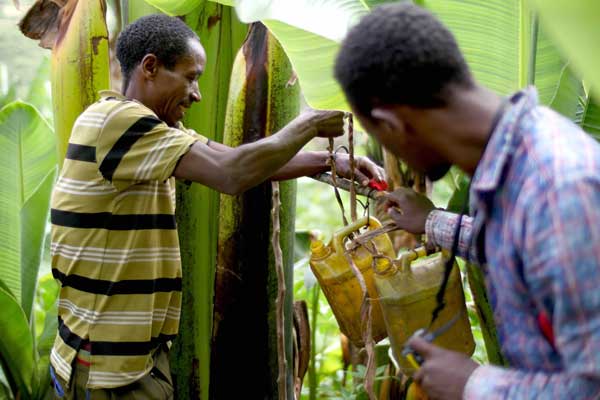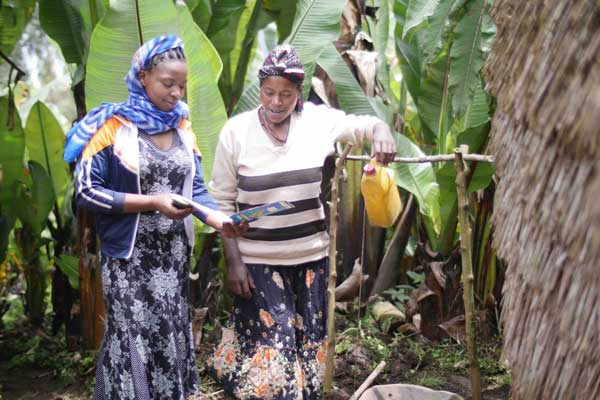The Life-Saving Tippy Tap
HOPE-JP • May 12, 2020
What exactly is a Tippy-Tap?
You might think this cute and catchy word has something to do with dancing or some new game, but it plays a very important role. Since its invention in the 1980s, starting with Africa, this simple handwashing setup has spread across many regions in developing countries that lack water systems and it has helped improve sanitation in local communities.
Tippy
refers to tip, and Tap
is a faucet. Using the lever principle, it is a very simple mechanism to literally tip over a water can containing water to let it flow out.
Tippy Taps can be easily made at zero cost
The only materials required to make a Tippy Tap are a jerry can that is commonly used to fetch water, bamboo poles or sticks, and a long rope. Jerry cans are commonly found in every home (in the local communities) so their cost is negligible.
It's very simple to make. Two bamboo poles or wooden sticks are made to stand upright on the ground, and another is put horizontally across on top like a clothesline. The jerry can is hung by its handle from the horizontal stick on top, the rope is tied to the cap and then a short stick is tied at the other end on the ground so that it can work as a pedal. When you step on the pedal, the jerry can tilts over and water flows out through a small hole.
Tippy Tap. Inexpensive and simple. It can be easily adopted by every family.
A Cheap and Environmentally Friendly Life Saver
In Japan, it is normal to wash both hands with tap water at the same time, but in developing countries where tap water isn’t available in homes, people collect water in plastic containers and wash their hands by pouring water out from the container, or with a jug. This means one hand must hold the container, which prevents dirt from being washed away properly from that hand. Rubbing your hands together is important to get rid of contaminants and germs. However, with a Tippy Tap, you can wash both hands at the same time without touching anything, which helps to prevent diseases.
Furthermore, the small hole in the jerry can allows water to trickle out, so you can wash your hands with a small amount of water. And it’s easy to stop the waterflow by taking your foot off the pedal so you can conserve water.
HOPE and Tippy Taps
HOPE not only constructs water systems in the remote villages of southern Ethiopia but we also provide awareness and training on hygiene and sanitation practices. Providing handwashing instructions to the local communities is essential at our intervention sites where water is not easily accessible, especially since the custom of washing hands is not a common practice.
When the construction of the water supply starts, our field educators visit each family to inform them of the importance of hand washing and we also recommend the use of Tippy Taps. If handwashing is made easier by using Tippy Taps, the habit will take root.
Changes in hygiene and sanitation awareness among rural Ethiopians
Residents of the Bonke district in southern Ethiopia are used to washing their faces and hands with water from streams and puddles. After the construction of a water system is completed and becomes functional, those who get sick from using contaminated water can regain their health with access to clean water from HOPE’s water system. Furthermore, the use of Tippy Taps makes handwashing easy, so they can wash their hands before meals and after using the toilet, making themselves less susceptible to infectious diseases such as cholera and typhoid fever.
Understanding the importance of hand washing can also help raise awareness about hygiene and sanitation. Locals who previously defecated in the open, and used to dry their dishes on the ground, now build and use toilets in their homes and use dish drying racks. The added benefit is that for many households the improvement of hygiene has reduced their medical costs and thus has helped ease their household finances.
Small things can make a big difference
We have repeatedly seen that a small change in the awareness of hygiene and sanitary practices in local communities can greatly improve their lives. Similarly, each and every little contribution can make a big difference to those living in the distant villages of Ethiopia.
Your support can help improve the hygiene and sanitation of local Ethiopian communities, prevent infectious diseases, and contribute to making major positive changes in their lives.














